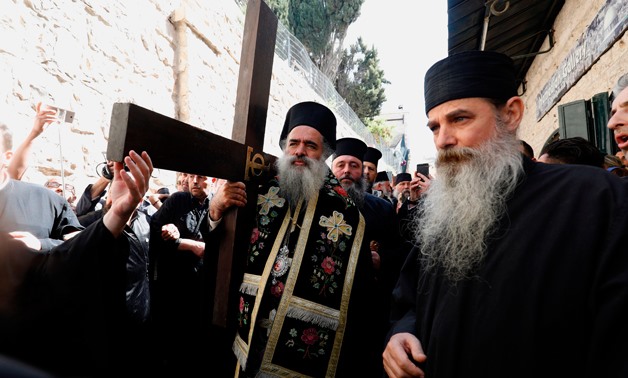
A Greek Orthodox bishop carries a large wooden cross with fellow worshippers along the Via Dolorosa (Way of Suffering) during the Orthodox Good Friday procession in Jerusalem's Old City on April 6, 2018. / AFP / GALI TIBBON
CAIRO – 7 April 2018: A total of 300 Egyptian Coptic pilgrims have filed a lawsuit against Air Sinai over canceling their flights to Jerusalem, an official at the Cairo International Airport told Egypt Today on Saturday.
Air Sinai 4D 250 was cancelled due to "bad weather;" its passengers refused to leave the airport and filed a lawsuit, the official added on condition of anonymity as he was not authorized to brief the media.
Later, the company had to carry the passengers on board of another flight (Air Sinai 4D 54), which traveled to Tel Aviv's Israeli Ben Gurion Airport this morning, he said.
Egypt has built an air bridge to transport elder Coptic Christians, who are allowed to perform pilgrimage in Jerusalem during the Holy Week, the week before Easter, starting March 30 to April 7.
On April 2, five Air Sinai flights carrying 800 Coptic pilgrims headed to Jerusalem on Monday to celebrate Easter.
Air Sinai company is operating 26 flights from Cairo International Airport to Israeli Ben Gurion Airport to transport about 4,700 Christians this year.
Since 1979, after signing a peace treaty with Israel, late Pope Shenouda III of Alexandria banned Christians from traveling to Israel “unless it is with Muslims when it [Jerusalem] is liberated.”
Shenouda, who was at odds with Sadat over the treaty, was not the first Orthodox pope to ban traveling to Jerusalem. His precedent late Pope Cyril VI banned pilgrimage to Jerusalem in 1968, after its illegal annexation in 1967 by Israel.
The earlier ban was not only an objection to the annexation, it was also an objection to Ethiopian monks taking over Deir el-Sultan Monastery in 1970, allegedly with the help of the Israeli government. Before that, it was under the control of the Egyptian Church for hundreds of years.
Shenouda’s death did not end the ban. Since 2012’s Easter, representatives of the Egyptian Church have reiterated in press statements that it would deny sacrament to Copts who defy its ban.
Additional reporting by Hanan Fayed and Ahmed Hamada

Comments
Leave a Comment